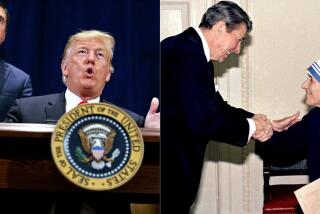Life Insurance Tax Would Force Many to Drop It, Congress Told
- Share via
WASHINGTON — President Reagan’s proposal to tax the increase in cash value of life insurance policies would force many Americans to drop their protection, industry spokesmen told Congress on Friday.
“Most of my clients will no longer be able to buy and keep permanent life insurance,” John R. Dobbs, an agent from Fargo, N. D., testified before the House Ways and Means Committee. “Why? Because the longer they hold the policy, the greater the tax they will be forced to pay.”
Reagan, as part of his plan for overhauling the federal income tax, proposed to tax the annual increase in value of life insurance. Allowing that value to escape tax is unfair because it “encourages individuals to save through life insurance companies rather than other financial institutions,” the White House contends.
Industry spokesmen maintain, however, that ordinary life insurance is not an investment but a protection. They note that a person may obtain the cash value only by surrendering the policy.
Tax on Health Benefits
Armed with voluminous testimony, industry representatives complained to the Ways and Means and Senate Finance committees about several provisions of Reagan’s plan, including the partial taxing of employee health benefits.
Under Reagan’s plan, workers who receive health benefits from their employers would be taxed on the first $120 in annual premiums. For families, the tax would be on the first $300 in premiums.
More to Read
Get the L.A. Times Politics newsletter
Deeply reported insights into legislation, politics and policy from Sacramento, Washington and beyond. In your inbox twice per week.
You may occasionally receive promotional content from the Los Angeles Times.










